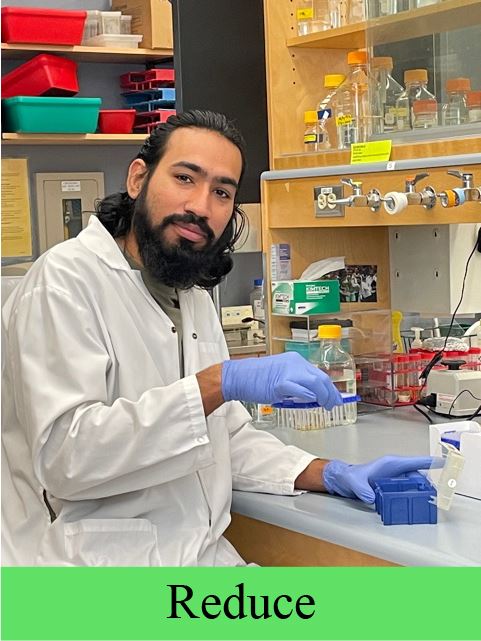- Home
- Budding Ideas: Lab Sustainability
Minimizing lab waste through sustainable lab practices
Plastic waste has recently become a global issue. As re- sponsible researchers, we must reduce plastic waste. I never enjoy throwing away plastic lab consumables such as used tips, micro centrifuge tubes, petri dishes, weighing boats, and falcon tubes. It is important to shed some light on this topic and come up with strategies for sustainable lab practices. According to a study, researchers from a life sci- ence lab reported that their laboratory-generated 267 tons of plastic waste in a year (Bistulfi, 2013). By ignoring the current situation, our earth may become a plastic football in the near future.
“Reduce, Reuse, Recycle” is the universal waste reduction law that can apply to our household waste as well as our daily lab life. By reducing plastic waste, one can reduce the financial & environmental costs associated with it. The reduction can be achieved through a combined social, institutional, industrial, & individual approach. Since researchers account for less than 0.1% of the global population, we have a very small number of people to educate. It is possible to minimize lab waste to some extent by raising awareness of the problems & its impact on the environment. Institutions can also contribute towards reducing plastic waste by placing bulk orders for many labs to reduce plastic used in packaging & shipping. Furthermore, the industries that make lab consumables can pay attention to resource-efficient packaging, production, & design in order to make consumables that use less plastic without compromising quality. Some companies, such as Starlab, produce pipette tips that use 40% less plastic without compromising quality. Lastly, researchers can minimize plastic waste in labs by being proactive and responsible while conducting experiments. Researchers could plan experiments in such a way to minimize the use of disposable plastic ware; an alternative might be to use glassware instead of disposable plastic in basic experiments. In the short run, glassware is more expensive than plastic, but over time proven to be more economical and sustainable. In addition to motivating researchers to reduce plastic waste, measuring how much waste each person in the lab produces can also be helpful. A researcher who keeps track of waste will likely develop an instinct to reduce it. Reusing is a good way to minimize waste. Although some lab experiments require There is a large amount of plastic that is no longer recycled and is trashed for Automation of life science practices by robotics and new precision technology are playing a vital role in the future of life science in minimizing plastic waste. As an example, Acoustic Liquid Handlers from Beckman use sound waves to eject precisely-sized droplets from one source to the destination, changing the entire scenario of liquid handling in the lab. Currently, these machines are expensive, but they will become cheaper, more accurate, and more environmentally friendly over time. It is unlikely that laboratories will end their plastic waste problem overnight, but there are a number of actions they can take to divert waste from landfills. |
pkhatri4@uwo.ca Praveen Khatri (he/him, left) is a second year PhD student in Cell and Molecular Biology. He is in Western University’s Department of Biology, where he studies isoflavanoids and their role in improving disease resistance in soybean in the Dhau- bhadel Lab at London Research and Development Centre, Agriculture and Agri-Food Canada, in London, Ontario. |

 accuracy and efficiency, some basic
accuracy and efficiency, some basic incineration due to improper sorting. The lab plastic waste problem can be solved by properly sorting and recycling it at the individual, group and institutional level. Recycling can occur at the individual level. For example, individuals can sort single-use plastic tips, tubes and plates from reusable ones. Institutions can collect these items and reuse them by washing and autoclaving them together, saving time and energy. Companies like Starlabs operate take-back programs to collect tip boxes from labs to reuse, and
incineration due to improper sorting. The lab plastic waste problem can be solved by properly sorting and recycling it at the individual, group and institutional level. Recycling can occur at the individual level. For example, individuals can sort single-use plastic tips, tubes and plates from reusable ones. Institutions can collect these items and reuse them by washing and autoclaving them together, saving time and energy. Companies like Starlabs operate take-back programs to collect tip boxes from labs to reuse, and Contributed by Praveen Khatri
Contributed by Praveen Khatri
